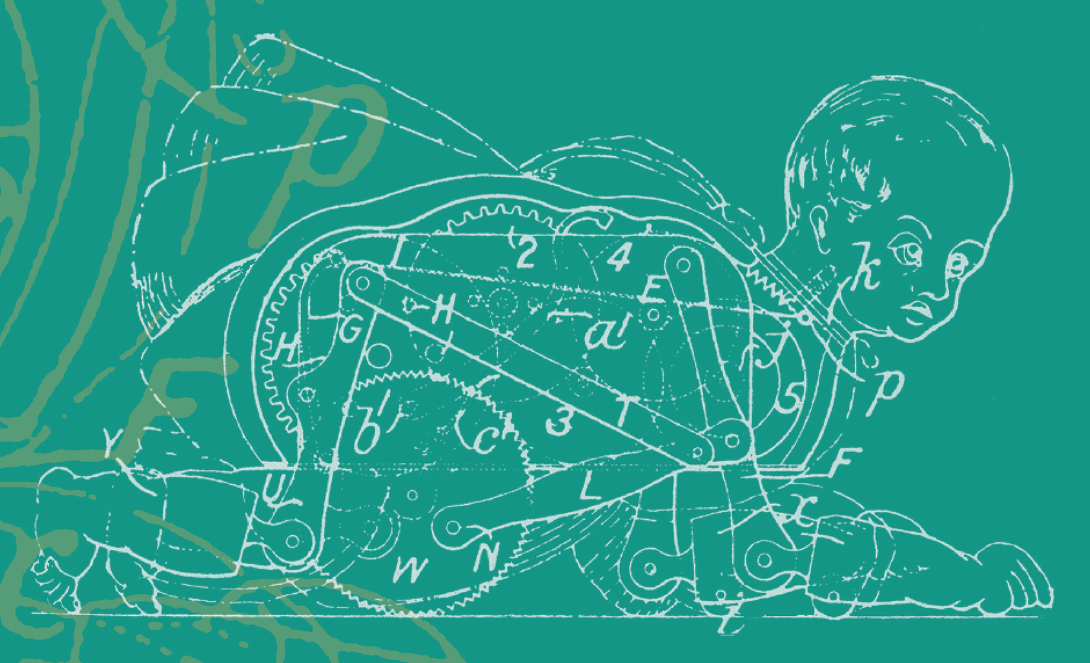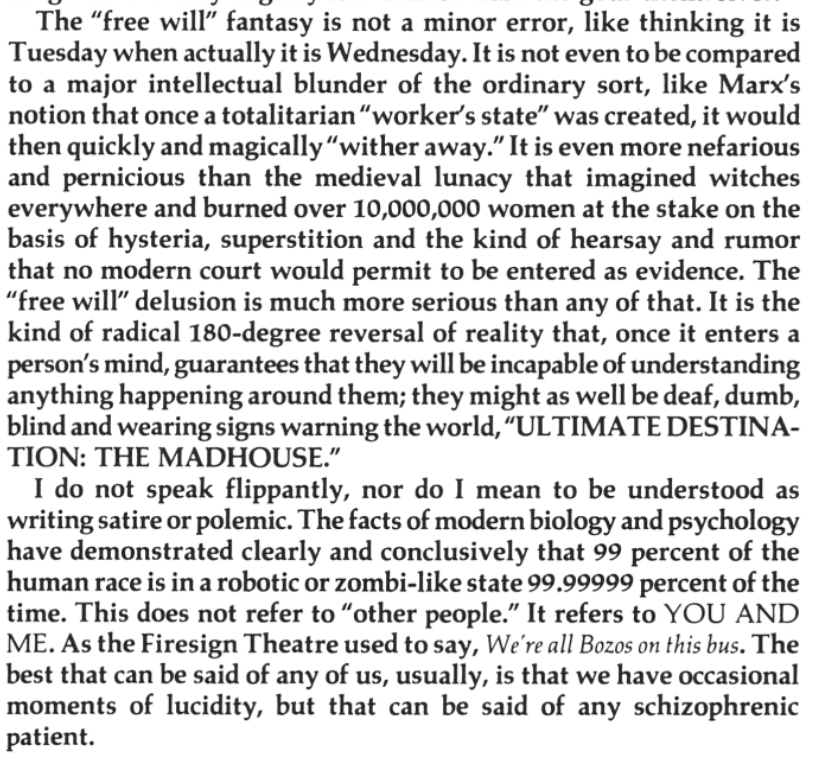free will
30 Oct 2021 - 28 Jun 2025
- One side of a bad dichotomy, determinism is the other. What pleasure, what intellectual joy, at rejecting both of them. How much energy is expended on the wars between these two decayed powers.
- Freedom of Choice by Devo in case this disappears as videos tend to do
- I try to avoid thinking about this hoary and unanswerable philosophical conundrum, based on the simple heuristic that nobody has made progress on it in thousands of years. Like "consciousness," it's best avoided. Leave it to the philosophers while the smarter people work on soluble problems.
- The Rationalists think this is a laughably easy problem, sort of a starter issue, and they have lengthy and elaborate treatments of that.
Free will is one of the easiest hard questions, as millennia-old philosophical dilemmas go. Though this impossible question is generally considered fully and completely dissolved on Less Wrong, aspiring reductionists should try to solve it on their own.
- As always with Rationalism, my default stance (or prior, to use their lingo) is it looks superficially insightful and clever, but on deeper examination there will be something terribly wrong with it. What could that wrong thing be in this case?
Such questions must be dissolved. Bad things happen when you try to answer them. It inevitably generates the worst sort of Mysterious Answer to a Mysterious Question: The one where you come up with seemingly strong arguments for your Mysterious Answer, but the "answer" doesn't let you make any new predictions even in retrospect, and the phenomenon still possesses the same sacred inexplicability that it had at the start.
- Ah this is exactly the opposite of the Weird Studies pro-mystery stance. I'm sort of torn between them, although trying to lean Weird because I like those people better, but by my inner nature I'm probably more Rationalist, bitch about it though I might.
Mystery exists in the mind, not in reality. If I am ignorant about a phenomenon, that is a fact about my state of mind, not a fact about the phenomenon itself. All the more so, if it seems like no possible answer can exist: Confusion exists in the map, not in the territory. Unanswerable questions do not mark places where magic enters the universe. They mark places where your mind runs skew to reality.
- This too, it's an anti-weird manifesto. But what is wrong with it? It supposes a concrete and objective thing called "reality", with the mind as consisting of imperfect models of that reality. This sounds sensible, yet something in me wants to scream that it is both boring and wrong. It diminishes the mind, which is engaged in actively creating reality if it is truly mind at all.
- Free Will is one of those terrible concepts that pits two immovable certainties against each other:
- the feeling of autonomy one has as an active agent in the world. We seem to have a degree of freedom, and are held responsible for it. The force of the Cartesian cogito, the only thing we can be certain
- The undeniable reality that we are also meat computers who operate according to deterministic physical laws.
- Apparently this is the standard work for Godelian arguments for libertarian free will The Freedom of the Will. Lucas Gödel, Escher, Bach is partly a counterargument against this stance.
- Foreknowledge and Free Will (Stanford Encyclopedia of Philosophy)](https://plato.stanford.edu/entries/free-will-foreknowledge/))
- It should be obvious that free will and an omniscient god who can see all moments simultaneously are incompatible, but (unsurprisingly) there is a lot of argument about it.
- How Can Free Will Work? | Closer to Truth (a bunch of short interviews including Jaron Lanier (!?))
- See the unwritten Free Will is Incoherent
- What about Good and Real, state-of-the-art block-world thinking?
On the contrary, people often insist that determinism would indeed make choice futile even in such clear-cut situations. Accordingly, many reject determinism and invent an incoherent ‘‘free will’’ to preserve a sense of efficacy of their actions. Even those who explicitly disavow free will may still need to pretend other- wise in order to salvage the feeling that choices matter (for example, Minsky advocates such a subterfuge in The Society of Mind, p. 307). When I reflect that the future and past alike sit immutably in spacetime, I do feel an uncomfortable challenge to the notion that my choices make a difference, even in the most clear-cut instances.
- There's an elaborate theory based around Newcomb's Paradox.
- I'm going to use illusionism for views like Minsky's – that we don't have free will but have to believe as if we do.
- Robert Sapolsky has a new book Determined: Life Without Free Will by Robert Sapolsky review – the hard science of decisions | Science and nature books | The Guardian which seems dumb at a glance, but maybe that's just marketing.
- Meaningness
I don’t have any position on free will or the mind/body problem. I don’t understand them. I doubt anyone else does either!
- This is wise, but also a bit ... evasive? It evades the problem of moral judgement. I wager he doesn't think much of that either. I am not sure that is honest. We are always making judgements, aesthetic if not moral but the implications are the same.
- From The Illusion of Conscious Will , Daniel Wegner
- Meaningness has almost exactly the same take as I do A philosophical zombie | Buddhism for Vampires
Some physicalists (most famously, Daniel Dennett) argue that we are all zombies. There is no what-it-is-like to see a glowing red LED. Your brain registers the fact that it is red, but there’s no “subjective experience” apart from that brain event. And, it couldn’t be any other way; so zombies are, in fact, inconceivable. The implications of his claim are, like everything else in this tangle, unclear.
I’ve wrestled with these problems for decades, and I can’t make any sense of them. All the possible solutions to the mind-body problem seem wrong...Generally, I think pretty clearly, and am pretty smart. So I figure anyone who thinks they aren’t confused about this, is probably so confused they don’t realize they are confused... My guess is that the problem is wrong. It asks a question that inherently makes no sense.
- From Robert Anton Wilson's introduction to Undoing Yourself (mentioned on WS Discord and looks like yet another self-improvement book that I should read)

